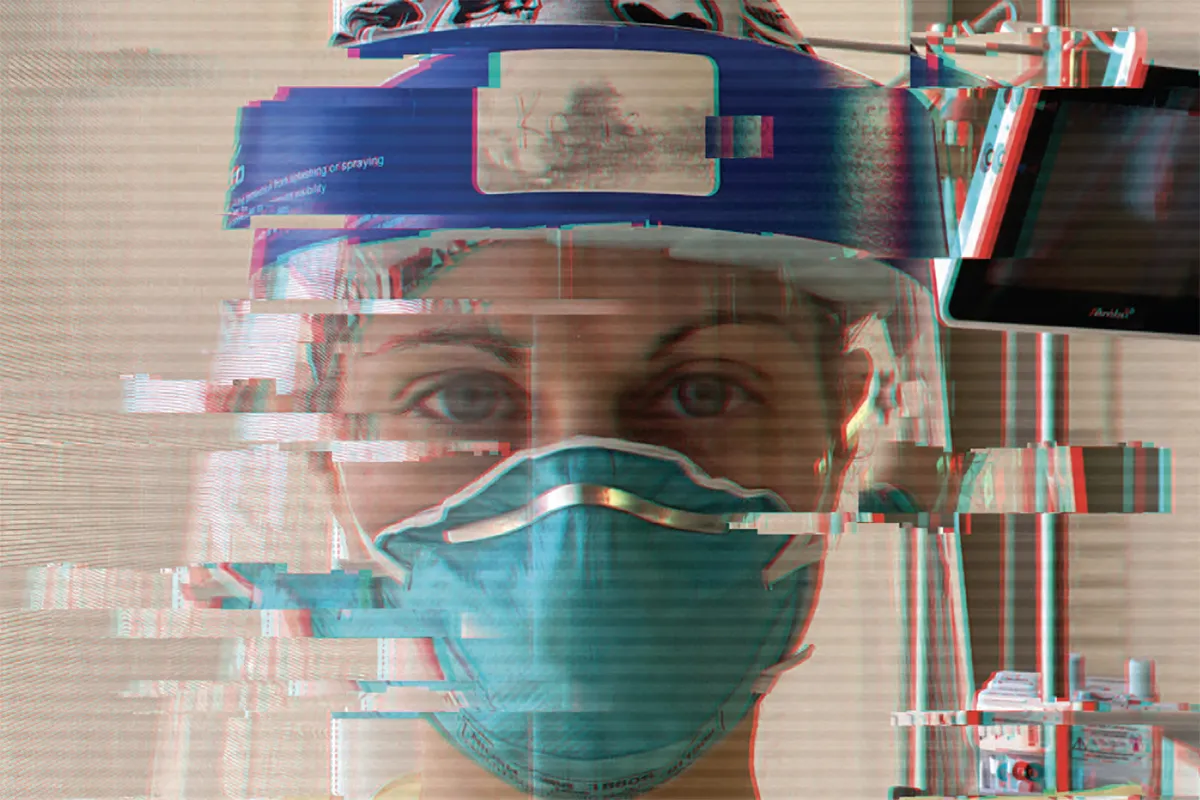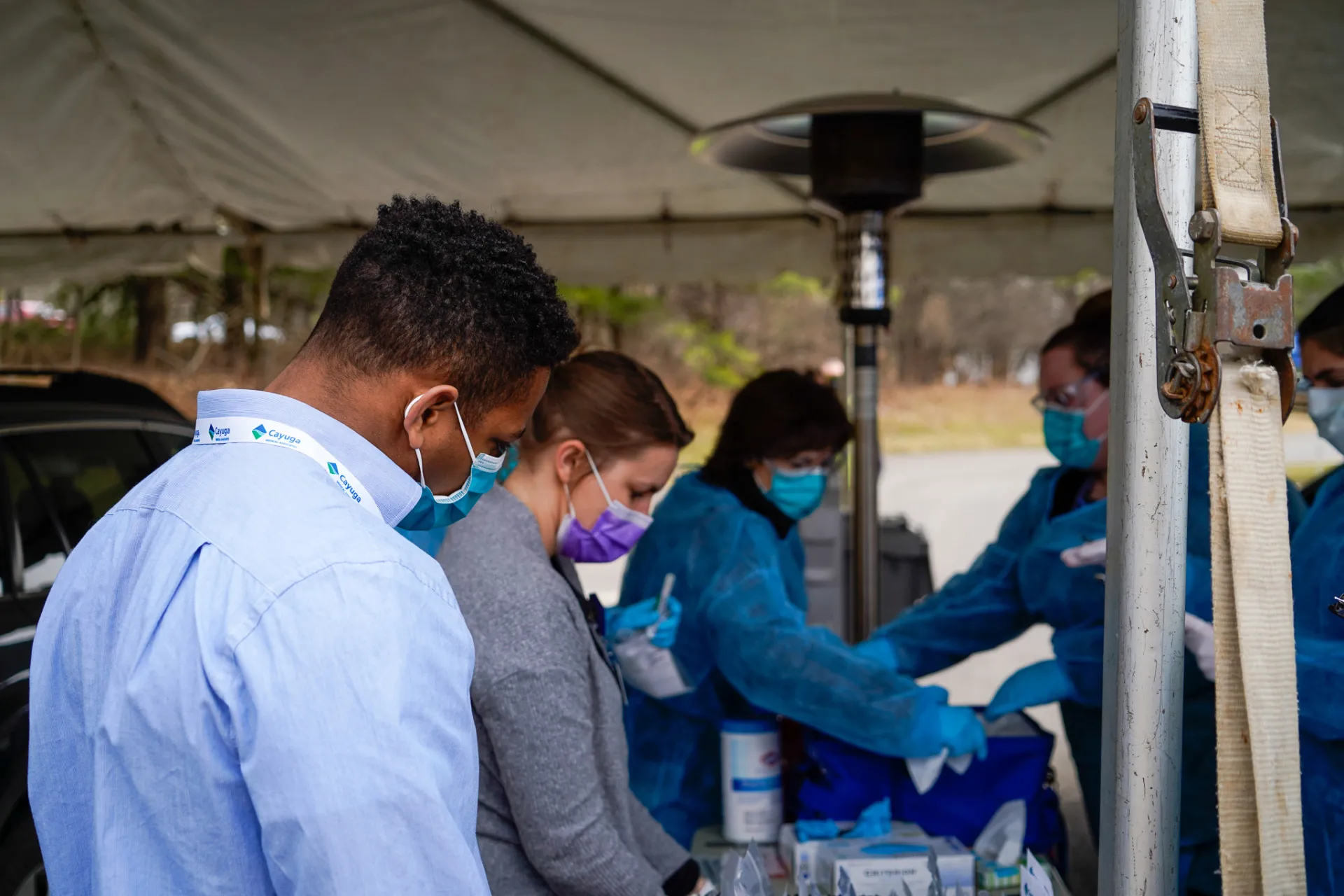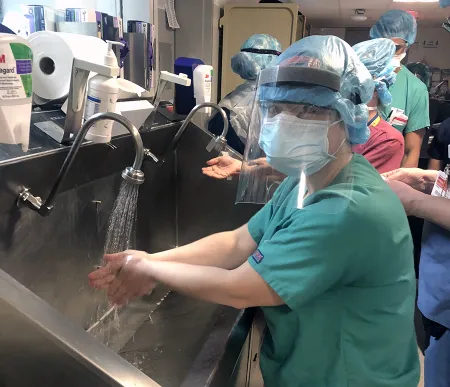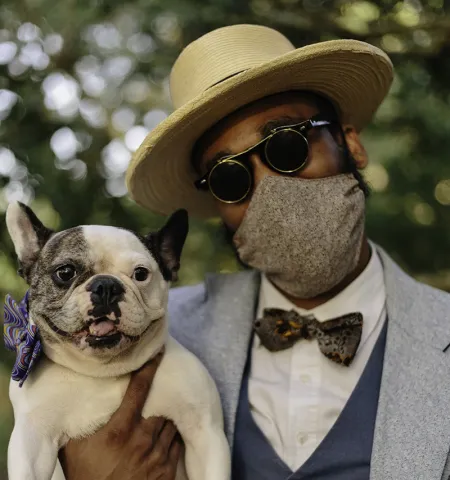In a world obsessed with finding and managing “the new normal,” the mega-storm of the coronavirus brought unrelenting squall lines of “the new worst.” Those who went out to meet it were among our best. But before we knew them as frontline heroes and essential workers, many of them were Ithaca College students.
Healing in a Time of Turbulence

Katie Paccione '12 is a registered nurse at New York-Presbyterian/Columbia University Medical Center in New York City.
“It was like watching a wave coming in from the ocean, where you see it from a distance, but you can’t grasp the size of it until it’s already on top of you.”
Jonathan Green ’09, funeral director
IN MARCH, funeral director Jonathan Green ’09 was on a conference call getting projections from the Fairfield, Connecticut, health department.
“I remember thinking, ‘These numbers can’t be right. They must be thinking statewide,’ only to find out they meant locally,” Green said. Fairfield County alone had more deaths at the time than 34 states combined. “Everything just happened so quickly, and, as we were watching the news, the numbers they were reporting just grew exponentially. It was like watching a wave coming in from the ocean, where you see it from a distance, but you can’t grasp the size of it until it’s already on top of you.”
When Katie Paccione ’12, a registered nurse, approached the room of a COVID-19 patient for the first time, she willed herself forward. “We’ve been hearing about this. It’s real now, and you can’t turn around,” she told herself. Part of everyone’s reaction was due to the staggering workload, and part of it was worrying they’d get infected, or worse, that they’d spread it to others. “Every time you walk into that room you have to wonder if this is it,” Paccione said. Single and both living alone, she and physical therapist Victoria Rainaud ’13, DPT ’15, volunteered to work with COVID-19 patients in hopes of sparing their colleagues who have families and/or medical conditions that make them more vulnerable to contracting the virus. “I’d want to take the hit before them,” Rainaud said.
“If I had ever designed a simulation exercise like COVID-19 with the scale and the speed...and the communications challenges that we faced, people would have simply not accepted it — or almost laughed at it — because it would seem almost too unrealistic.”
Melinda Frost ’88, a risk communication expert with the World Health Organization
Doing his best to protect his patients and his own family, infectious disease doctor Jay Sellers ’05 adheres to strict protocols for personal protective equipment (PPE) and does his best to digest the daily volumes of guidance that come in. Knowledge is power, but information can drown you. With 25 years of experience in 45 countries on her résumé, Melinda Frost ’88 is a risk communication expert with the World Health Organization, helping not only with epidemics and pandemics but also with “infodemics,” which occur when an overabundance of information makes finding a solution more difficult or even paralyzing. Sometimes just locating answers to simple questions can become impossible. Another part of her job is creating simulation exercises to test how entities would communicate during an emergency. Frost, who formerly worked for the Centers for Disease Control and Prevention, said, “If I had ever designed a simulation exercise like COVID-19 with the scale and the speed...and the communications challenges that we faced, people would have simply not accepted it — or almost laughed at it — because it would seem almost too unrealistic.”
With COVID-19, it was the speed that killed, largely because the surges overloaded the medical system. With every swell of new patients, swamped health care workers thought that they must be hitting the crest. But each time the tide rose, they rose to meet it.

Greg Lee '19 (left) at the COVID drive-through testing center at the Shops at Ithaca Mall.
People, places, and things morphed into different kinds of people, transformed places, and new things as the searing heat and high pressure of the disease welded, molded, and remodeled. For example, physical therapist Madeline Arena ’13, DPT ’15, worked in an operating room that was transformed into an intensive care unit. Health care administrators Anna Rosenblatt ’12, Greg Lee ’19, and Teresa Craugh ’19 helped turn a mall parking lot into a drive-through testing site. Previously on ventilators, some patients awoke to find themselves inexplicably adrift in a neon sea of theme park ponchos and hotel shower caps — makeshift substitutes for scarce PPE.
Nursing students like Angela Grumley ’17, who was sent home from her Columbia University graduate program, were called to hospitals at New York’s COVID-19 ground zero. In her first hours, Grumley saw death and a rebirth. Registered nurses like Paccione became overnight experts in the virus. Office-based physical therapists like Rainaud, given the option to sort supplies in the hospital’s warehouse, chose instead to work in a COVID-19 ward in a hospital with one of the highest numbers of cases.
During easier times when they were all Ithaca College students, none of these people could possibly have imagined what they were headed for. So, even though most have said that this is what they signed up for, they never could have provided informed consent for something like this. But as their raucous neighbors have poured their appreciation into city streets at 7 p.m. every night, these heroes have said that — on most days — the coronavirus reaffirmed their decision to become frontline workers.
Their vignettes may be stories of people who were lost or stories of people finding themselves, tales of things received or things sacrificed, scenes of impossible days and decisions or scenes of resilience and reason, stories of jobs and businesses upended or stories of flexibility and nimbleness. But perhaps the most shocking part of the pandemic is that, from despair, we can find hope.
These are their stories.
Read More

Madeline Arena ’13, DPT ’15,washing her hands at the hospital where she works.
Final Journeys: Waves of Grief and Hope
Jonathan Green '09 confronts a rising tide of tragedy
Protecting Them While They Protect Us
The importance of personal protective equipment
Notes from a Pandemic
The healing power of music
Trial by Fire
Angela Grumley '17 experienced the full spectrum of life and death on her first day in a COVID ward.

Edward Wycliff '11 pivoted his bow tie business to start making masks. (Photo by Daniel Grey)
Up Close and Personal with COVID-19
Physical therapists take on the duty of "proning" patients
Insight from On Site
How IC alumni turned a mall parking lot into a pandemic testing site
Alumnus Sells Masks in New Orleans to Help Artists in Africa
Edward Wycliff '11 enlists the help of artisans to make masks